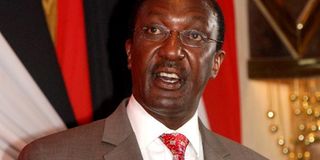Naikuni and Kenya Airways bosses face probe over Sh26bn loss

Former Kenya Airways CEO Titus Naikuni. Mr Naikuni, present boss Mbuvi Ngunze and other top managers are on the spot over the near collapse of the airline, which recorded a Sh26 billion loss in the last financial year. FILE PHOTO | SALATON NJAU | NATION MEDIA GROUP
What you need to know:
- The turnaround plan will involve a major shake-up that may include slashing salaries of the airline pilots.
- Their salaries are considered to be among the highest in the world for comparable airlines.
- Kenya Airways has had a long-running dispute with its pilots, who have responded with an undeclared go-slow that is often responsible for flight delays.
Former Kenya Airways chief executive Titus Naikuni, present boss Mbuvi Ngunze and other top managers are on the spot over the near collapse of the airline, which recorded a Sh26 billion loss in the last financial year.
The National Treasury has questioned some of the critical investment decisions they made way back in 2009.
On Wednesday, National Treasury Cabinet Secretary Henry Rotich said a turnaround strategy for the airline would be ready in two months.
The turnaround plan would involve a major shake-up that may include slashing the salaries of the airline's pilots.
Their salaries are considered to be among the highest in the world for comparable airlines.
“When you compare the salary of an Ethiopian Airlines pilot and that of a KQ pilot, the difference is so huge.
"To avoid loss making, some decisions have to be made to rescue the airline,” he said.
Kenya Airways has had a long-running dispute with its pilots, who have responded with an undeclared go-slow that is often responsible for flight delays.
Other measures to save the airline include dropping some routes, selling idle aircraft, including some new Boeing Dreamliners, and reviewing the partnership with KLM.
“The government still believes that KQ is an important link in making Nairobi a regional hub and therefore, just like we did in Mumias, KQ will rise again,” Mr Rotich said.
Mr Naikuni and others, who sat on the board when decisions were being made on the future of Kenya Airways, will be questioned on investment choices seen as responsible for the record loss.
Two foreign firms — Mckinsey and Seabury — have already been hired to examine what went wrong and provide viable solutions.
The government has also sent experts and external auditors to launch full investigations into the status of the airline.
The experts are investigating whether managers and directors might have had selfish motives at the expense of the airline.
The decisions, which included leasing of planes, awarding pilots huge salaries, acquiring short-term debts and agreeing to the terms of another airline that holds shares in the company, have been listed as the major reasons Kenya Airways is in near collapse.
Mr Rotich said the former management made strategic errors by making projections in terms of revenue tied to the investments.
However, the government cannot claim innocence as it has all along been represented on the Kenya Airways board, through the Treasury and the Ministry of Transport, when critical decisions were made.
Mr Rotich said the airline is now paying leases on “planes that are just parked”.
“The expectations were made earlier when a decision was reached to buy big planes with the hope of flying to China, US, Korea and Vietnam. But what the management failed to interrogate was the negative side,” he said.
He said the management did not take into account other possible factors such as declining tourism, Ebola, and stiff competition.
This means that planes acquired as leases are being paid for even though they remain parked at the airport.
“The owners do not care whether the planes are operational or not. All they want is the lease to be paid,” he said.
It has also emerged that an agreement with Air France-KLM over routes may have badly injured the healthy operation of the Kenya Airways.
KLM owns 26 per cent of the total KQ shares while the government has 30 per cent.
“We are also looking into the agreement we had with KLM — are they impacting negatively on the airline success?” Mr Rotich posed.
He said Kenya has the highest cost structures, a situation that has in return resulted in a loss of competitiveness.
He said the airline took short-term loans that had attracted huge interests, which should not have been the case.




